HEU-EFS at the 33rd Annual EORS Meeting
A Showcase of Innovation and Collaboration
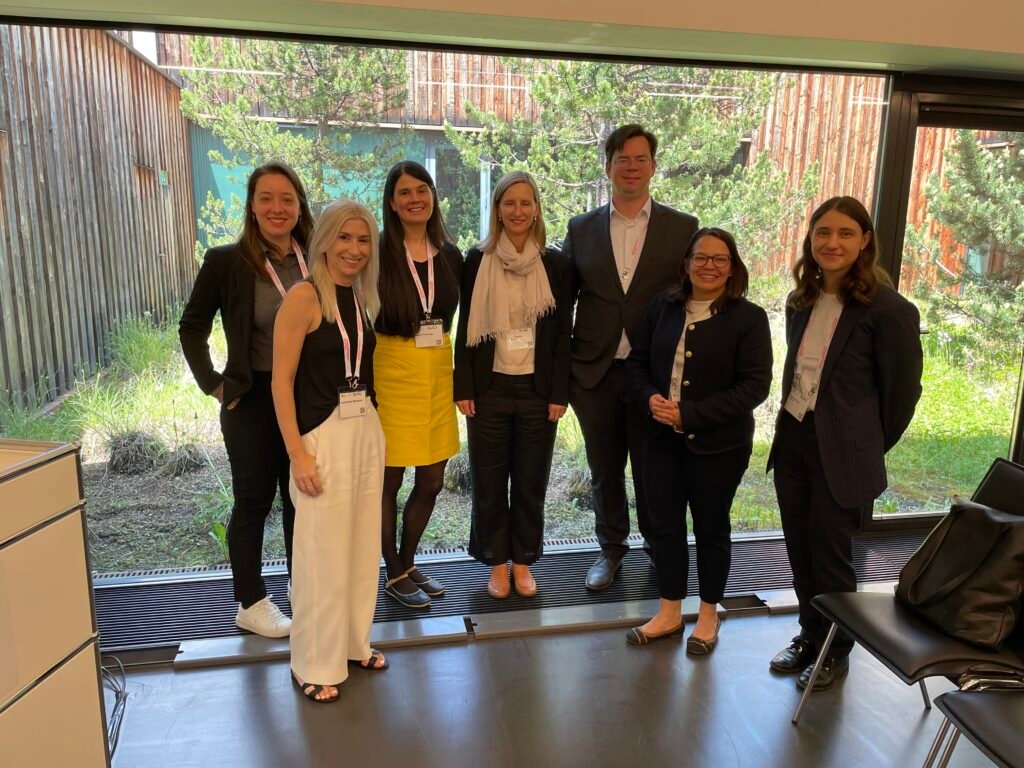
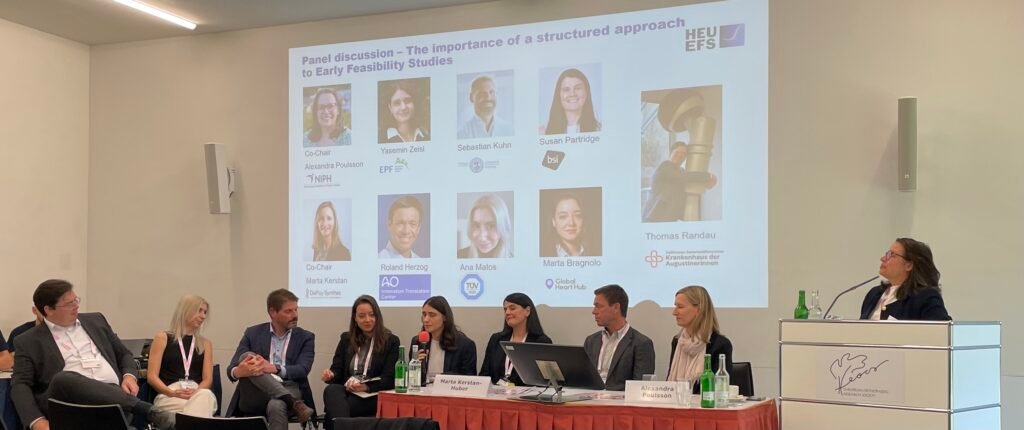
We are excited to share the highlights from the 33rd Annual Meeting of the European Orthopaedic Research Society (EORS) in Davos, Switzerland, where the HEU-EFS project was prominently featured.
The event, held from June 16 to 19, 2025, brought together leading experts and stakeholders to discuss critical systems, infrastructure, and policy frameworks needed to drive innovation in orthopaedic research. The HEU-EFS project used this platform to disseminate its latest results and developments through a panel discussion.
Here are some reflections from our esteemed panelists:
- Marta Kerstan, DePuy Synthes: “The symposium was a resounding success! The lectures provided invaluable perspectives from patient organizations, medical devices and digital health technology, surgeons, regulators, scientists, and investors. The interactive panel discussion fostered idea exchanges, making it a remarkable opportunity for learning and collaboration.”
- Yasemin Zeisl, EPF: “Engaging patients throughout the lifecycle of medical devices is essential. It enhances legitimacy, transparency, and accountability in clinical research and innovation, ensuring that real-world experiences shape their development.”
- Susan Partridge, BSI: “This was a great opportunity to present the Notified Body perspective on early feasibility studies at the HEU-EFS symposium in Davos. I thoroughly enjoyed the valuable insights from all panel members.”
- Alexandra Poulsson, NIPH: “The EORS combined conference with ARI Orthopaedics and the International Society for Computer Assisted Orthopaedic Surgery (CAOS) was a great opportunity to showcase the achievements of the HEU-EFS project. It fostered important discussions with researchers, clinicians, patient associations, Notified Bodies, SMEs, and large medical device producers.”
- Ana Matos Machado, TUV Sud: “Harmonizing EFS can significantly enhance the EU market’s attractiveness for innovation”.
- Marta Bragagnolo, GHH: “Involving patients early in the process leads to better outcomes for everyone—patients, clinicians, and innovators alike. Innovation without patient partnership is incomplete. Let’s build healthcare solutions with patients, not just for them.”
We are proud of the impact and visibility the HEU-EFS project has gained through this event and look forward to continuing our efforts to drive innovation in clinical trials.
Innovative Health Initiative (IHI) MedTech Europe EFPIA – European Federation of Pharmaceutical Industries and Associations COCIR EuropaBio – the European Association for Bioindustries Vaccines Europe
#IHITransformingHealth #EvidenceGeneration #MedTech #ClinicalTrials #OrthopaedicResearch
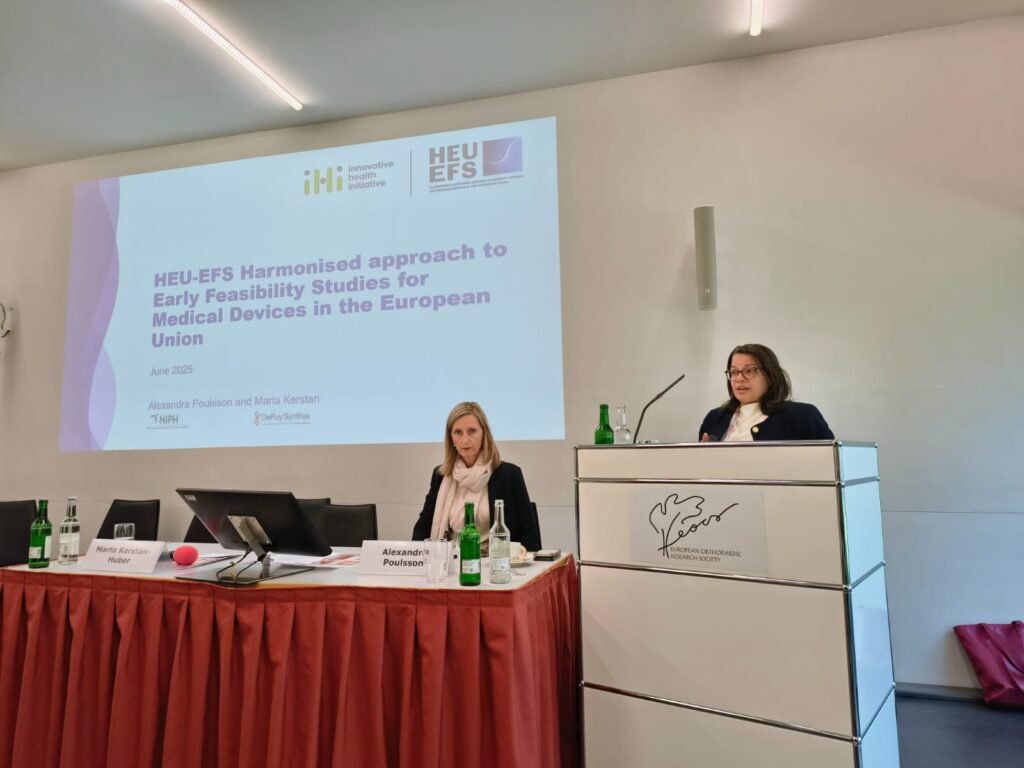
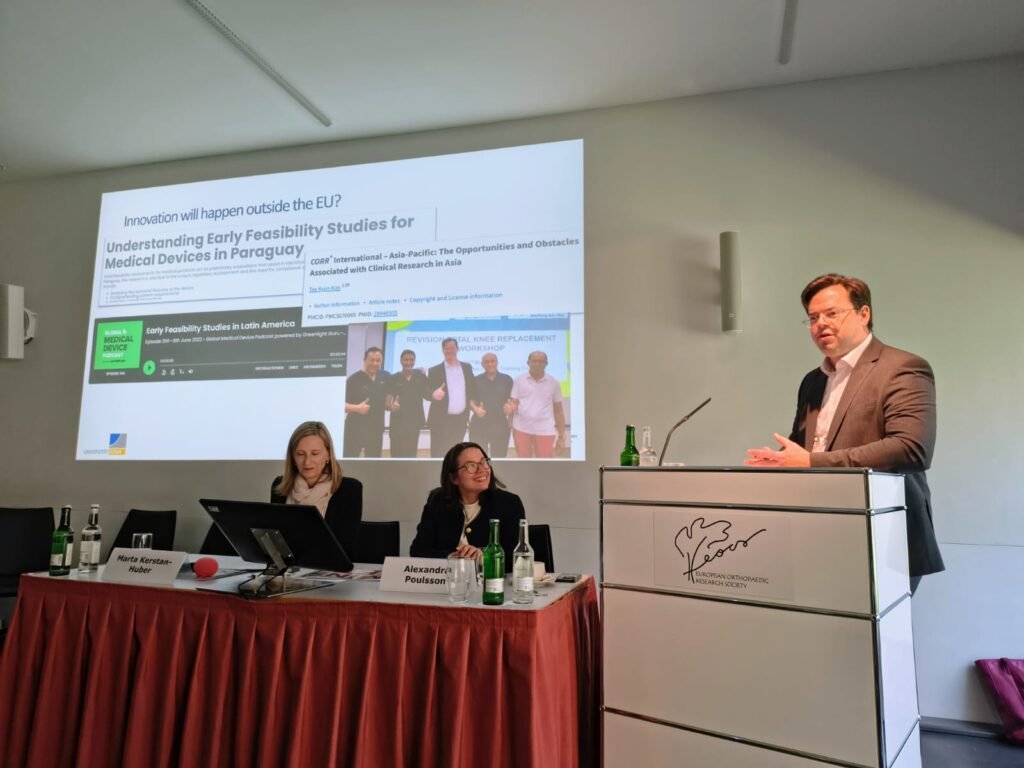
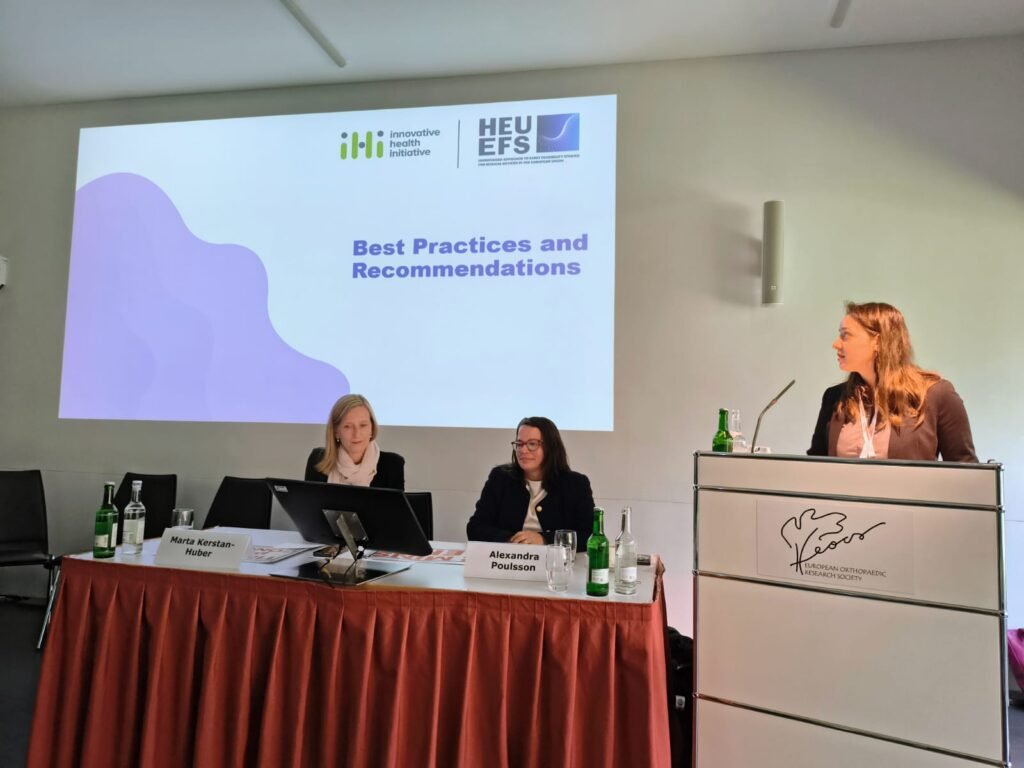
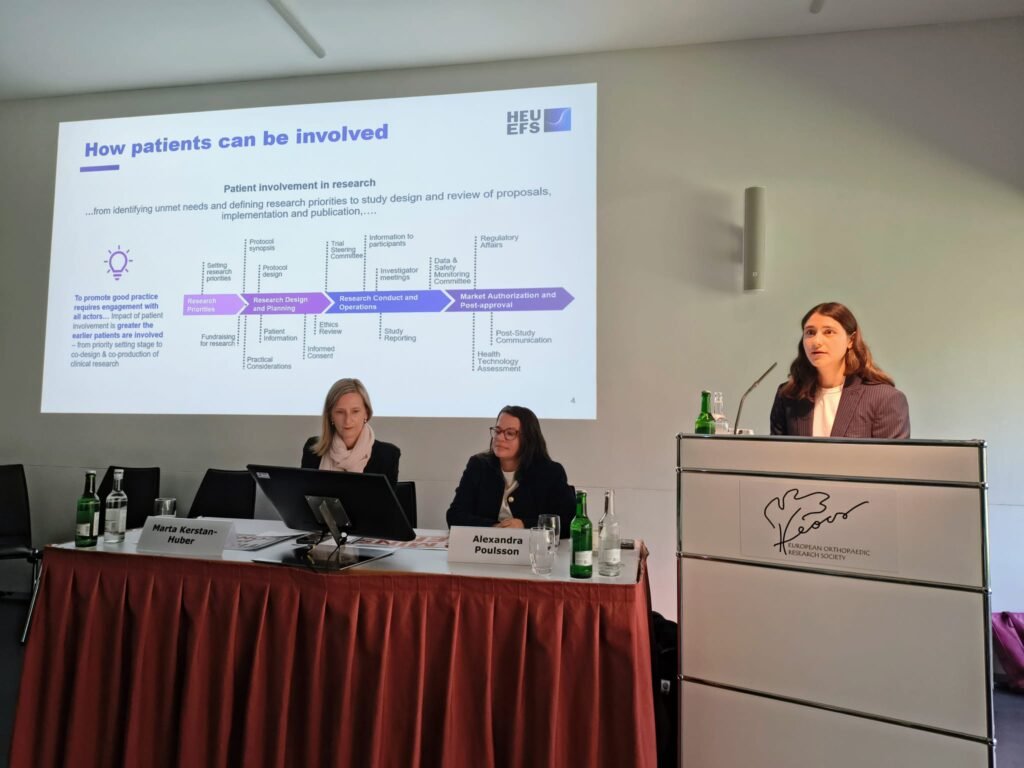
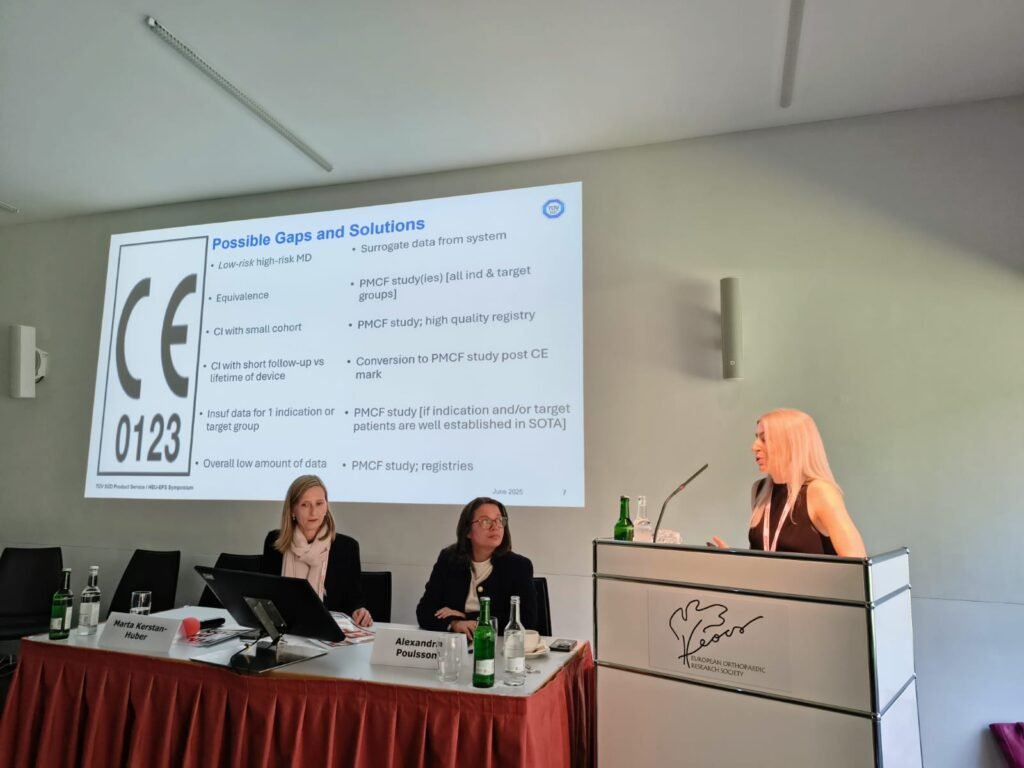
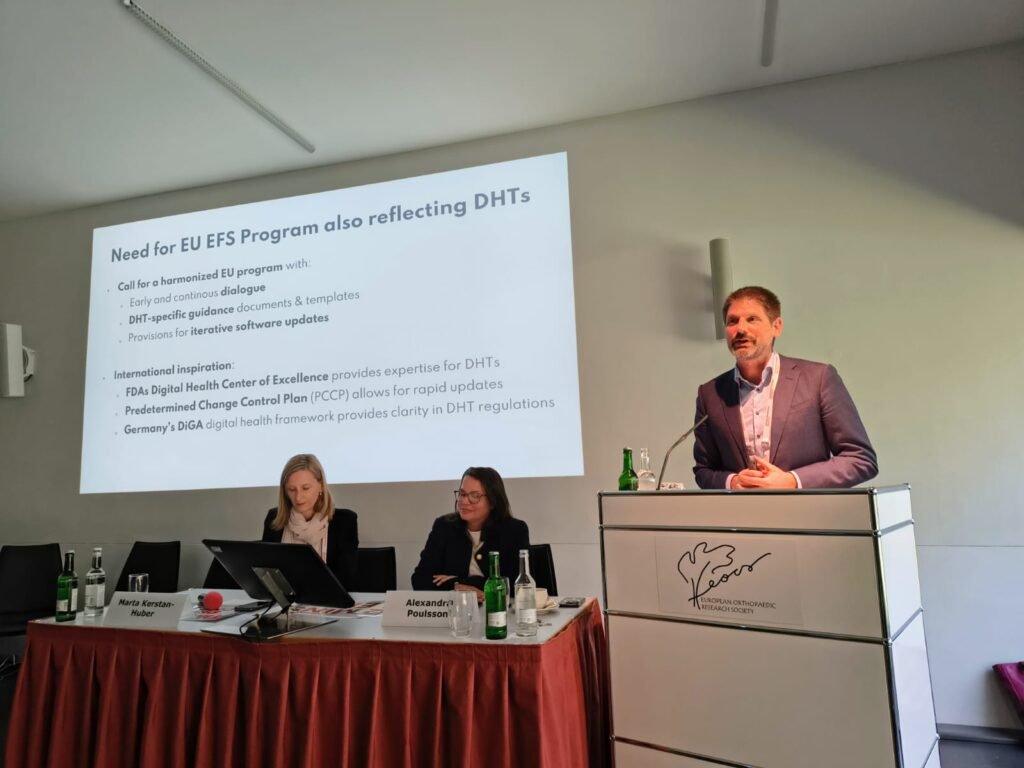
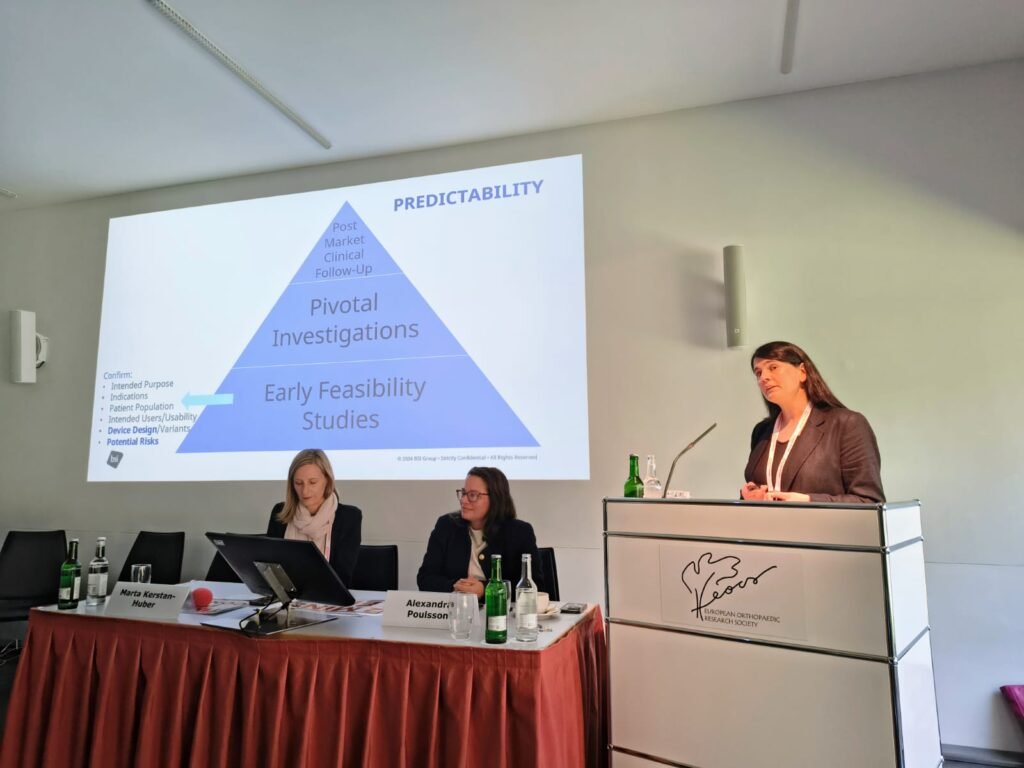
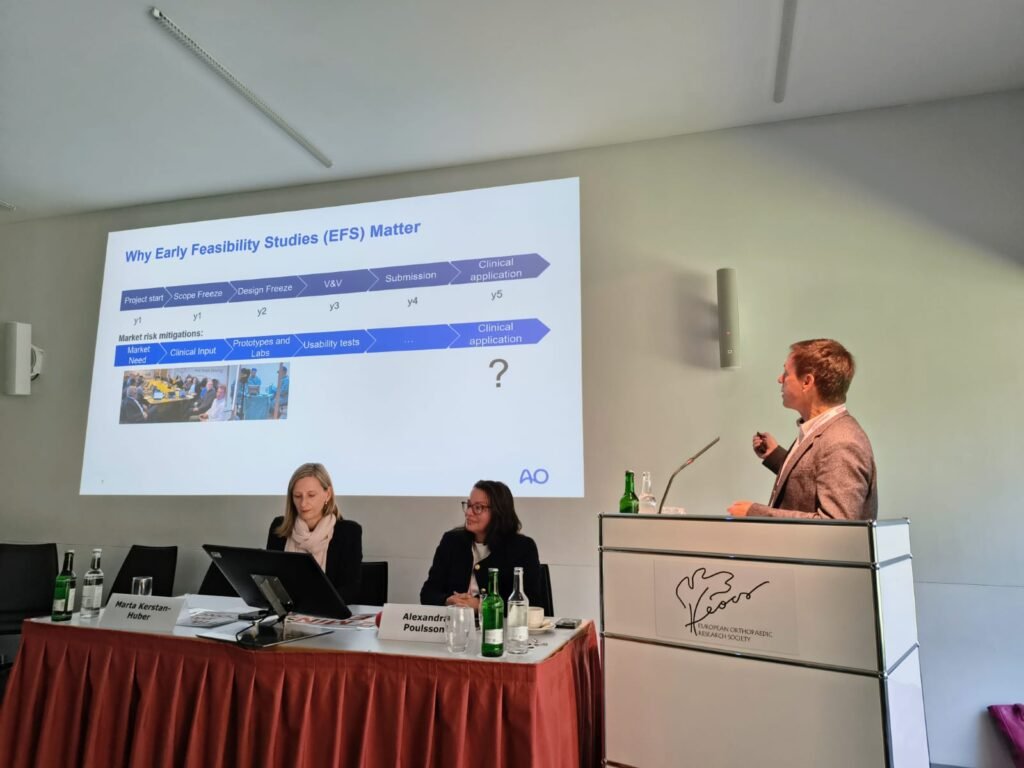
Featured in the photos (l-r): Alexandra Poulsson from the Norwegian Institute of Public Health (podium) and Marta Kerstan from DePuy Synthes, Thomas Randau from Krankenhaus der Augustinerinnen, Marta Bragagnolo from Global Heart Hub, Yasemin Zeisl from European Patients’ Forum, Ana Matos Machado from TÜV SÜD, Sebastian Kuhn from The Philipp University of Marburg, Susan Partridge from BSI, and Roland Herzog from AO Foundation
Other Materials
Newsletters
Issue #2 June 2025
Issue #1 November 2024
Project featured in Journals
Priorities for medical device regulatory approval: a report from the European Society of Cardiology Cardiovascular Round Table
Stephan Windecker; Alan G. Fraser; Piotr Szymanski; Martine Gilard; Thomas F. Lüscher; Leila Abid; John Brennan; Robert Byrne; Lia Crotti; Inga Drossart; Jennifer Franke; Mario Gabrielli Cossellu; Ajay J. Kirtane; Jana Kurucova; Mitchell Krucoff; Gearóid McGauran; Patrick O. Myers; Donal B. O’Connor; Radosław Parma; Paul Piscoi; Archana Rao; Andrea Rappagliosi; Giulio Stefanini; Eigil Samset; Alphons Vincent; Ralph Stephan von Bardeleben; Franz Weidinger
European Heart Journal, 46 (16), April 2025, Pages 1469–1479, https://doi.org/10.1093/eurheartj/ehaf069
FutureTrials25
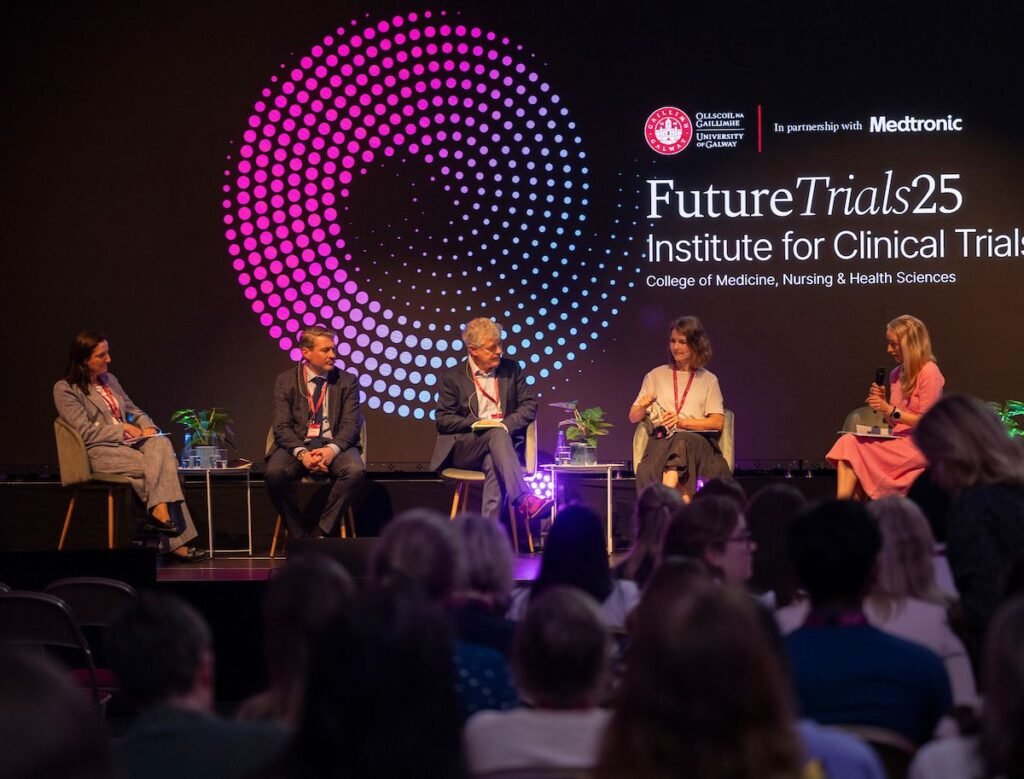
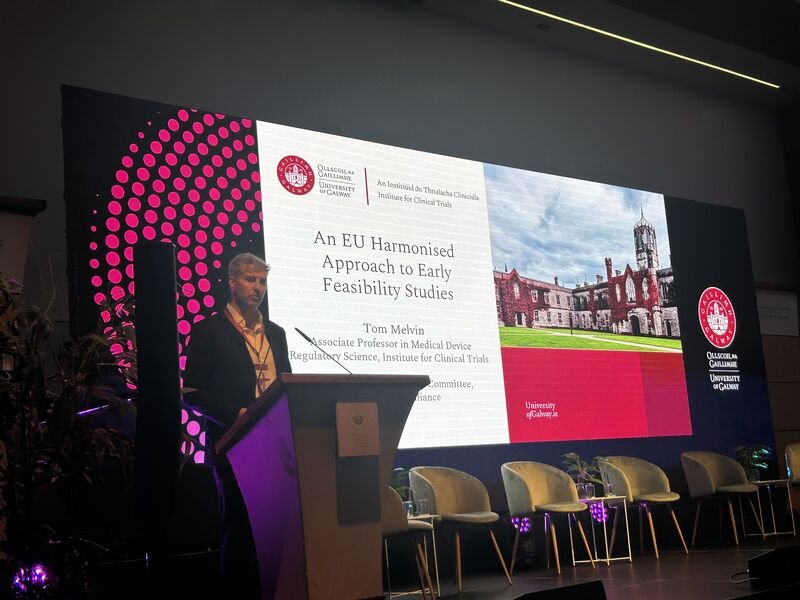
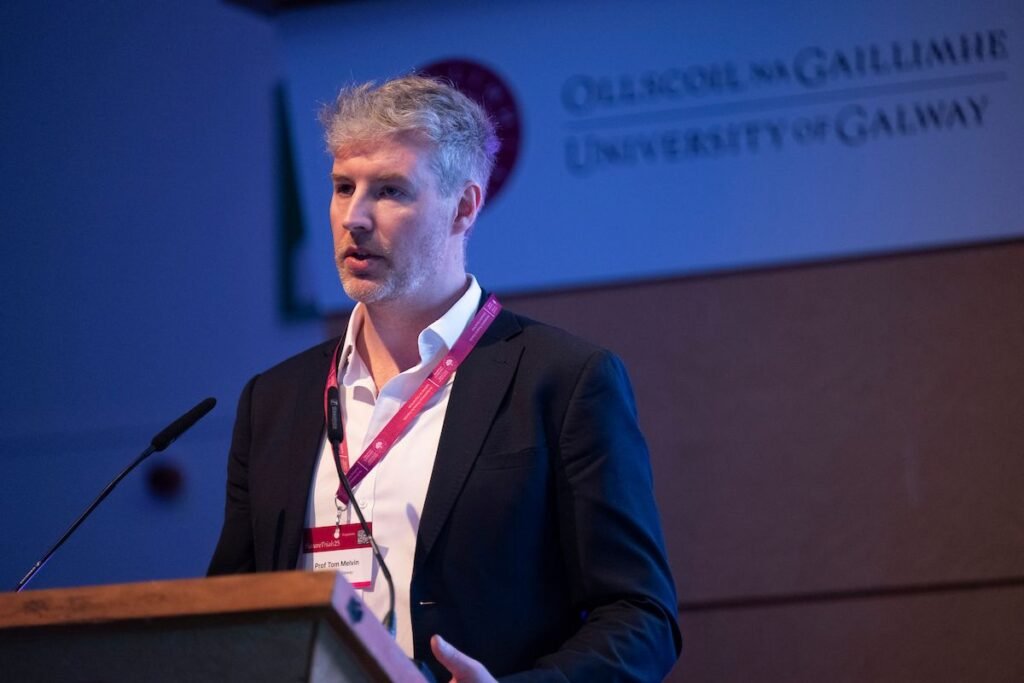
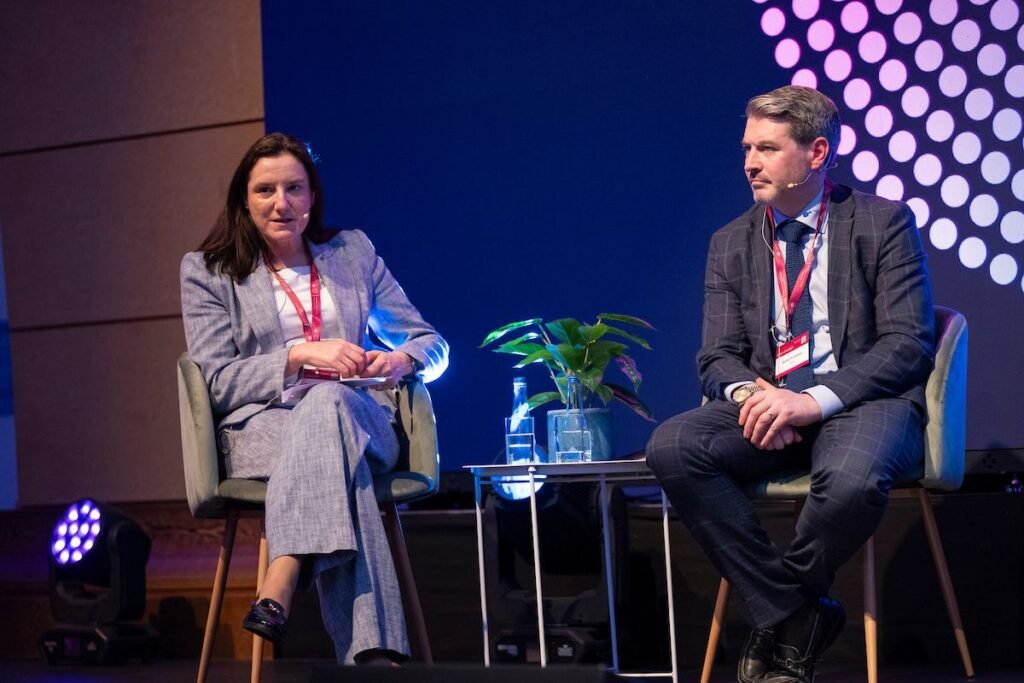
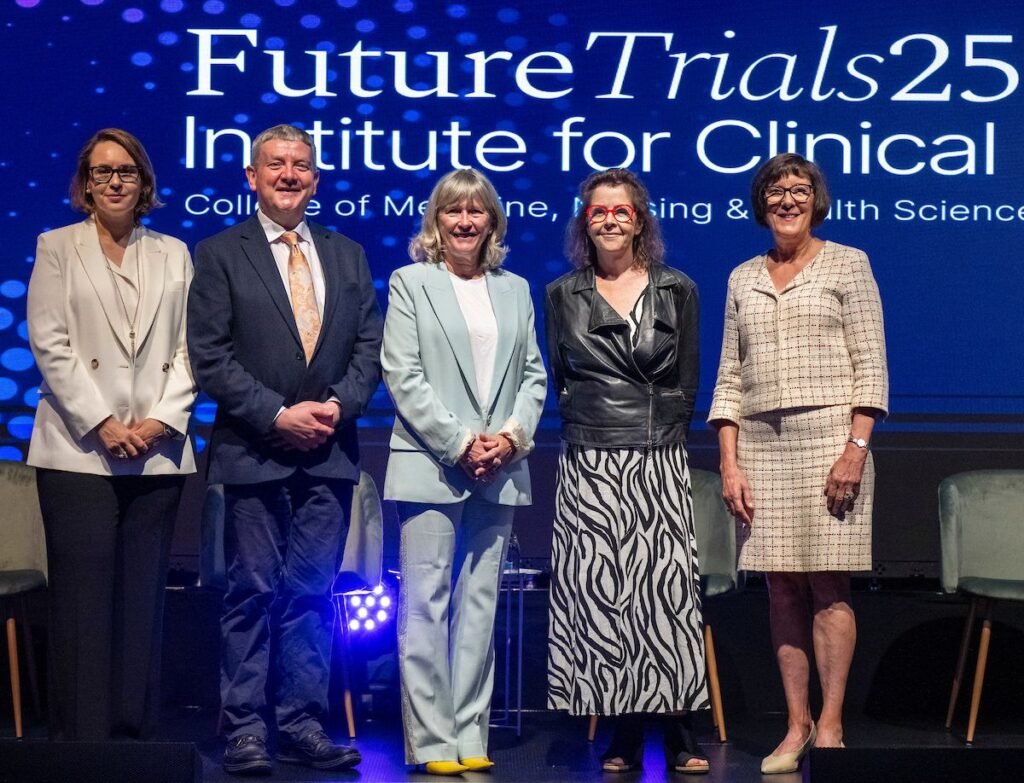
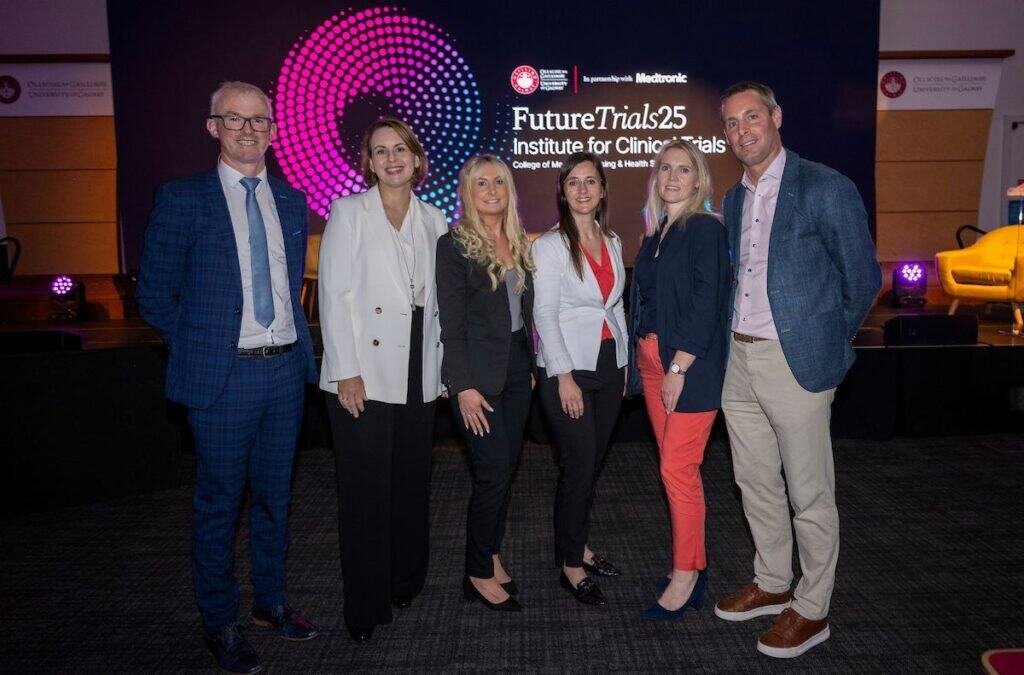
We are excited to announce that Associate Professor Tom Melvin from the University of Galway, and a member of the HEU-EFS consortium, presented our project at the #FutureTrials25 event.
Event Overview: Organised by the University of Galway – Institute for Clinical Trials in partnership with Medtronic, a member of the HEU-EFS public-private consortium, this event brought together leading experts and stakeholders to discuss the critical systems, infrastructure, and policy frameworks needed to drive innovation in clinical trials. The audience included researchers, policymakers, healthcare professionals, and industry leaders.
HEU-EFS Presence:
- In the session titled “Fostering an Enabling Landscape,” Prof. Tom Melvin shared valuable insights on the “EU Harmonised Approach to Early Feasibility Studies.” This session highlighted the importance of regulation, collaboration, and infrastructure in creating a thriving clinical trials environment.
- The session also featured a panel discussion with our advisory board member, Dr Donal O’Connor, representing the Health Products Regulatory Authority (HPRA). The discussion emphasised the need for greater harmonisation and stronger connections between policy and practice.
- In the third and final session, “Future Innovation/Emerging Technologies” Despina Voulgaraki, Senior Director for Clinical Research and Medical Science at Medtronic, delivered a keynote on the technologies and trends shaping the future of clinical trials, including artificial intelligence, decentralised models, and personalised approaches.
About HEU-EFS: The HEU-EFS project aims to develop a harmonised framework for conducting Early Feasibility Studies (EFS) for medical devices in the EU. By enhancing the uptake of EFS, we strive to boost the EU’s competitiveness and ensure that patients have access to innovative, safe, and effective medical technologies.
Innovative Health Initiative (IHI) MedTech Europe EFPIA – European Federation of Pharmaceutical Industries and Associations COCIR EuropaBio – the European Association for Bioindustries Vaccines Europe
#ClinicalTrials #EvidenceGeneration #PatientCare #IHITransformingHealth #MedTech
HEU-EFS @ EORS 2025
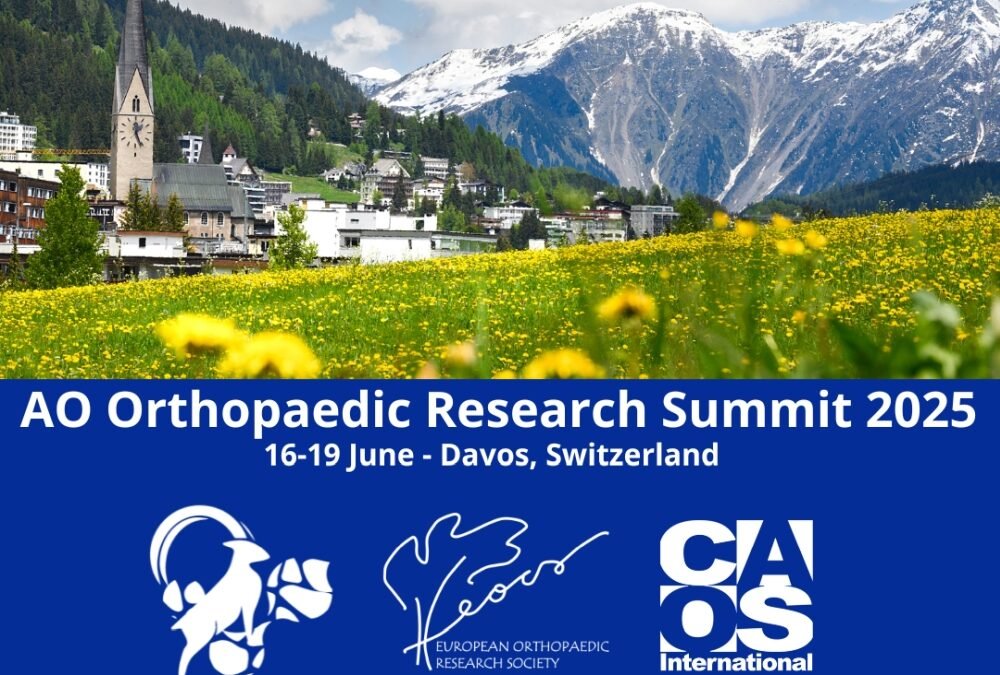
HEU-EFS attending European Orthopaedic Research Society Annual Meeting
We are pleased to announce that the HEU-EFS project will be showcased at the 33rd Annual Meeting of the European Orthopaedic Research Society Annual Meeting, taking place from June 16 to 19, 2025, in Davos, Switzerland. The Summit aims to promote research and development in orthopaedic surgery, as well as related sciences, through interdisciplinary coordination, exchange of scientific and technical experience, and education. The event will take place at the Conference Center Davos, a renowned venue for the World Economic Forum.
The HEU-EFS project will use #EORS2025 as a platform to disseminate its latest results and developments.
The session will begin with an introduction to the HEU-EFS Project by Alexandra Poulsson from the Norwegian Institute of Public Health and Marta Kerstan from DePuy Synthes, followed by a keynote address from Chief Medical Officer Thomas Randau. A series of short expert presentations will be delivered by Marta Bragagnolo from Global Heart Hub, Yasemin Zeisl from European Patients’ Forum, Ana Matos Machado (Neurosurgeon and Advisory Board Member of HEU-EFS), Sebastian Kuhn from The Philipp University of Marburg, Susan Partridge from BSI, and Roland Herzog from AO Foundation, culminating in a panel discussion featuring all speakers.
You are welcome to join us on Tuesday, 17 June, 11:15-12:40 (Room Sertig), to learn how HEU-EFS is driving innovation and improving clinical outcomes in orthopaedic research. Don’t miss this chance to connect with leading professionals and explore groundbreaking developments in the field.
Stay tuned for more updates and follow our journey at heuefs.eu.
Innovative Health Initiative (IHI) MedTech Europe EFPIA – European Federation of Pharmaceutical Industries and Associations COCIR EuropaBio – the European Association for Bioindustries Vaccines Europe
#IHITransformingHealth #EvidenceGeneration #MedTech
Newsletter sign up form
HEU-EFS: Advancing Inclusive Clinical Trials for Medical Devices

Developing and validating a medical device takes years of research and significant investment. #ClinicalTrials are a critical part of this journey, making it possible to bring life-changing treatments and technologies to patients. They offer patients early access to potentially groundbreaking therapies and play a vital role in advancing medical knowledge, improving care, and saving lives. 𝗛𝗘𝗨-𝗘𝗙𝗦: 𝗔𝗱𝘃𝗮𝗻𝗰𝗶𝗻𝗴 𝗜𝗻𝗰𝗹𝘂𝘀𝗶𝘃𝗲 𝗖𝗹𝗶𝗻𝗶𝗰𝗮𝗹 𝗧𝗿𝗶𝗮𝗹𝘀 𝗳𝗼𝗿 𝗠𝗲𝗱𝗶𝗰𝗮𝗹 𝗗𝗲𝘃𝗶𝗰𝗲𝘀
On the occasion of International Clinical Trials Day 2025, we honour the patients, clinicians, researchers, scientists and regulators across Europe who make clinical research possible. 👏
At the HEU-EFS project, we contribute to a better ecosystem for Early Feasibility Studies (#EFS) for medical devices in the EU. EFS are a critical step in the early #EvidenceGeneration pathway. By working on a Harmonised Approach to EFS in the EU (HEU-EFS), we aim to make Europe a more attractive environment for medical innovation and ensure patients have timely access to cutting-edge breakthrough technologies.
Innovative Health Initiative (IHI) MedTech Europe EFPIA – European Federation of Pharmaceutical Industries and Associations COCIR EuropaBio – the European Association for Bioindustries Vaccines Europe
#ICTD25 #MedTech #PatientCare
HEU-EFS at RAPS Euro Convergence 2025
The HEU-EFS consortium participated in RAPS Euro Convergence 2025, held from 13–16 May at the SQUARE Brussels Meeting Centre in Brussels, Belgium. This premier event brought together regulatory professionals, industry leaders, and innovators to explore the evolving landscape of healthcare regulations and medical technologies.
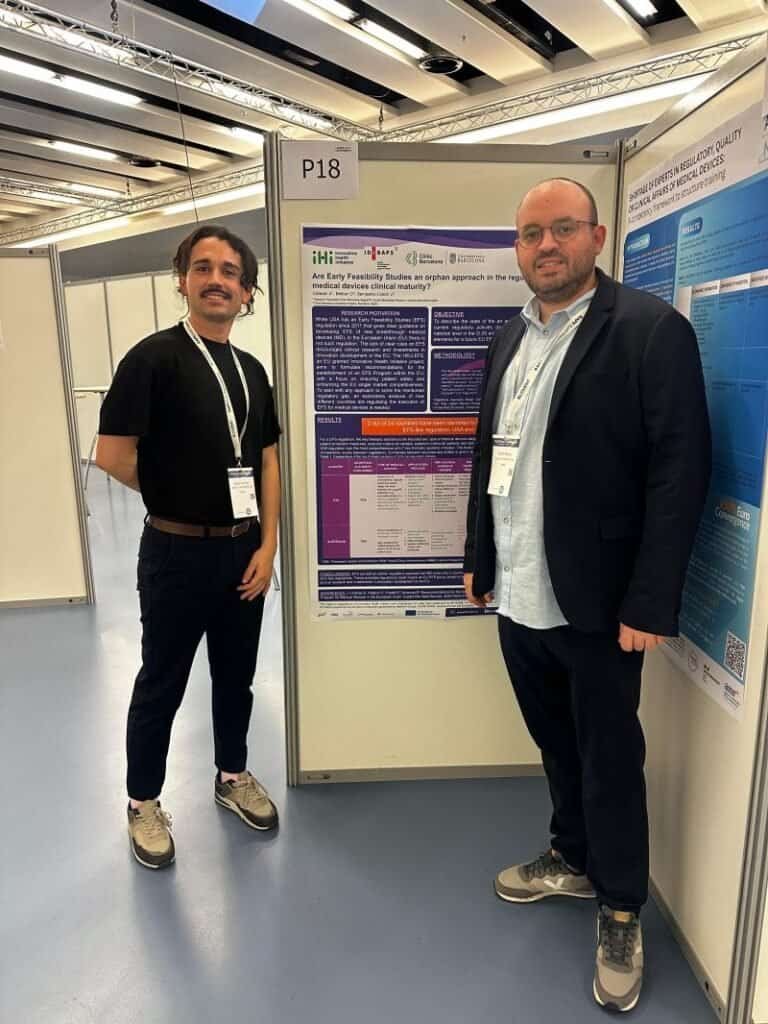
As part of the conference, a poster titled “Are Early Feasibility Studies (EFS) an Orphan Approach in the Regulatory Pipeline for Innovative Medical Devices?” was presented by members of the HEU-EFS project team, including Adrián Valledor Sánchez, in collaboration with Daniel Beltran Argudo and Laura Sampietro-Colom.
The poster explored the underutilization of Early Feasibility Studies (EFS) in Europe and their potential to accelerate innovation in the medical device sector. It emphasized the need for a harmonized regulatory framework to support EFS implementation, aligning with the broader goals of the HEU-EFS project—a collaborative initiative under the Innovative Health Initiative (IHI).
Throughout the event, the HEU-EFS team represented by Fundació Clínic per a la Recerca Biomèdica, Institut d’Investigacions Biomèdiques August Pi i Sunyer (IDIBAPS), and Hospital Clínic de Barcelona, engaged with stakeholders across the regulatory and MedTech communities, fostering dialogue on how EFS can bridge the gap between early innovation and patient access. The discussions underscored the importance of integrating patient perspectives and real-world evidence into early-stage research and regulatory planning.
RAPS Euro Convergence 2025 served as a vital platform for the HEU-EFS consortium to share insights, gather feedback, and strengthen partnerships aimed at transforming the future of medical device development in Europe
Tags: RAPS2025, HEUEFS, RegulatoryAffairs, MedicalDevices, EarlyFeasibilityStudies, InnovationForPatients, HealthTech
HEU-EFS @ ISPOR 2025
Advancing Early Feasibility Studies for Medical Devices
The HEU-EFS consortium was honoured to participate in ISPOR 2025, held from May 13–16 in Montréal, Canada—the leading global conference for Health Economics and Outcomes Research (HEOR). This year’s theme, “Collaborating to Improve Healthcare Decision Making for All: Expanding HEOR Horizons,” emphasized the importance of cross-sector collaboration in shaping equitable, data-driven healthcare systems
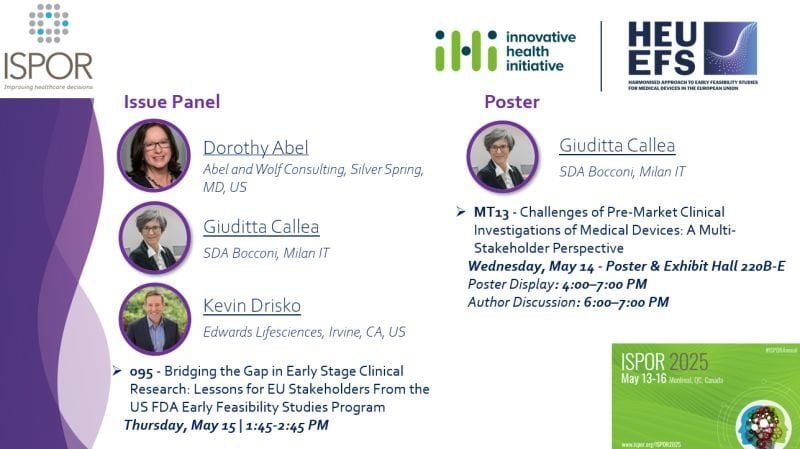
As part of the conference’s dynamic Issue Panel sessions, the HEU-EFS team presented “Bridging the Gap in Early Stage Clinical Research: Lessons for EU Stakeholders from the US FDA Early Feasibility Studies Program“
Moderated by Giuditta Callea (SDA Bocconi), the panel featured expert insights from:
- Dorothy Abel, Abel & Wolf Consulting
- Kevin Drisko, Edwards Lifesciences
The session explored the structure and impact of the US FDA’s Early Feasibility Studies (EFS) Program, highlighting its role in accelerating medical device innovation. Panelists discussed how similar strategies could be adapted within the EU regulatory landscape to address fragmentation and support early-stage clinical research.
Representing a collaboration of 22 public and private partners, the HEU-EFS project aims to develop a harmonized framework for EFS across Europe. The panel emphasized the importance of regulatory alignment, patient-centered design, and international knowledge exchange to foster innovation and improve patient access to novel technologies.
Why It Mattered
The HEU-EFS initiative aligns closely with ISPOR’s mission to make HEOR insights more actionable and inclusive. By integrating EFS into the broader conversation on evidence generation and value-based healthcare, the consortium contributes to shaping a more agile and responsive regulatory environment for medical devices.
Tags: ISPOR2025, HEUEFS, EarlyFeasibilityStudies, MedicalDevices, RegulatoryAffairs, EvidenceGeneration, InnovationForPatients, HealthTech
MedTech Forum 2025
𝗔𝗱𝘃𝗮𝗻𝗰𝗶𝗻𝗴 𝗘𝗮𝗿𝗹𝘆 𝗙𝗲𝗮𝘀𝗶𝗯𝗶𝗹𝗶𝘁𝘆 𝗦𝘁𝘂𝗱𝗶𝗲𝘀 𝗶𝗻 𝗘𝘂𝗿𝗼𝗽𝗲
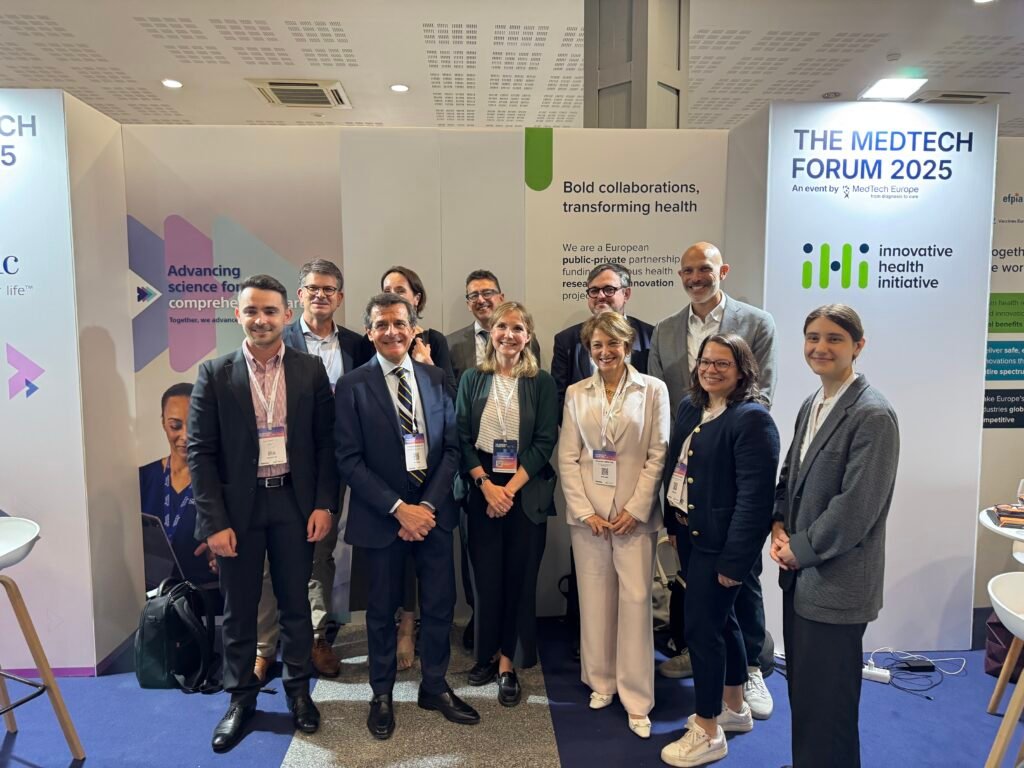
The #MTF2025 event in Lisbon, Portugal was a significant milestone for the project, which aims to revolutionize Early Feasibility Studies (EFS) for medical devices in Europe.
𝗞𝗲𝘆 𝗧𝗮𝗸𝗲𝗮𝘄𝗮𝘆𝘀
- 𝗖𝗼𝗹𝗹𝗮𝗯𝗼𝗿𝗮𝘁𝗶𝘃𝗲 𝗘𝗳𝗳𝗼𝗿𝘁𝘀: The session highlighted the power of collaboration among industry, academia, healthcare, and patient associations. This cross-sectoral partnership is crucial for developing a harmonized EFS methodology.
- 𝗣𝗮𝘁𝗶𝗲𝗻𝘁-𝗖𝗲𝗻𝘁𝗿𝗶𝗰 𝗔𝗽𝗽𝗿𝗼𝗮𝗰𝗵: Integrating patient input ensures that medical devices are tailored to patient needs, enhancing their effectiveness and acceptance.
- 𝗖𝗹𝗲𝗮𝗿 𝗚𝘂𝗶𝗱𝗮𝗻𝗰𝗲: Providing a roadmap for EFS will streamline processes for innovative companies, hospitals, and competent HTA authorities, making Europe a more attractive location for medical device innovation.
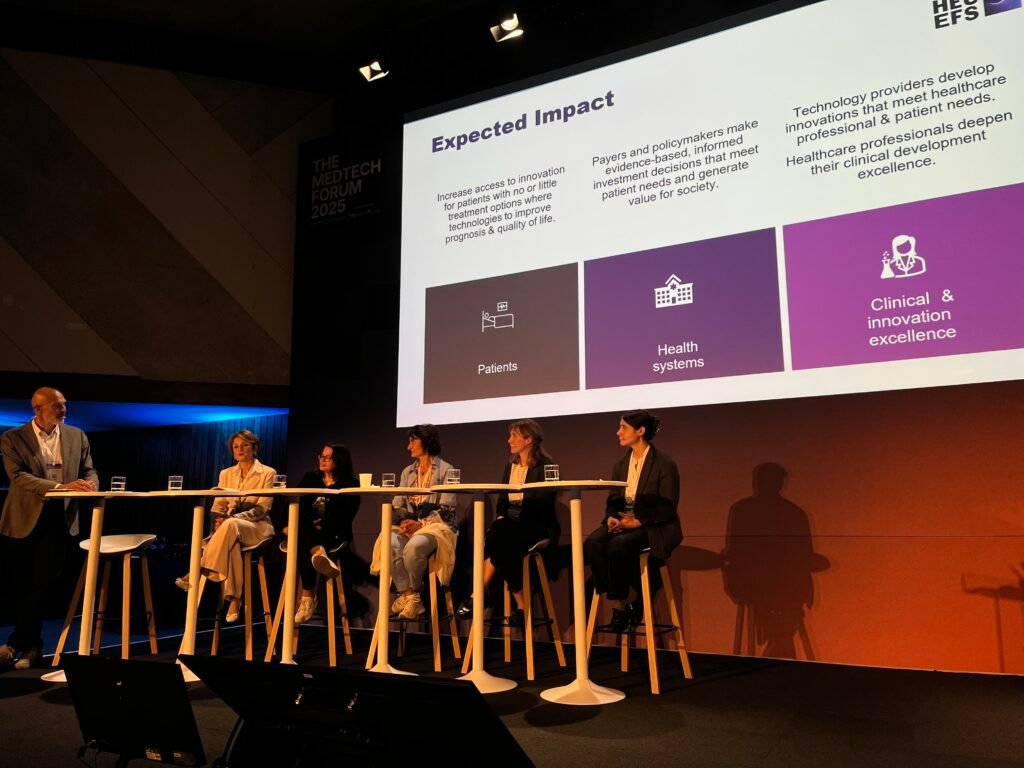
𝗙𝘂𝘁𝘂𝗿𝗲 𝗜𝗺𝗽𝗹𝗶𝗰𝗮𝘁𝗶𝗼𝗻𝘀
- 𝗕𝗼𝗼𝘀𝘁𝗶𝗻𝗴 𝗖𝗼𝗺𝗽𝗲𝘁𝗶𝘁𝗶𝘃𝗲𝗻𝗲𝘀𝘀: A harmonized EFS methodology will enhance Europe’s competitiveness in the global medical device market.
- 𝗔𝗰𝗰𝗲𝗹𝗲𝗿𝗮𝘁𝗶𝗻𝗴 𝗜𝗻𝗻𝗼𝘃𝗮𝘁𝗶𝗼𝗻: Well-run EFS will speed up the development and patient access to innovative devices, ultimately improving healthcare outcomes.
- 𝗥𝗲𝗮𝗹-𝗪𝗼𝗿𝗹𝗱 𝗜𝗺𝗽𝗹𝗲𝗺𝗲𝗻𝘁𝗮𝘁𝗶𝗼𝗻: The involvement of all stakeholders, driven by a common objective, increases the likelihood of successful implementation in the real world.
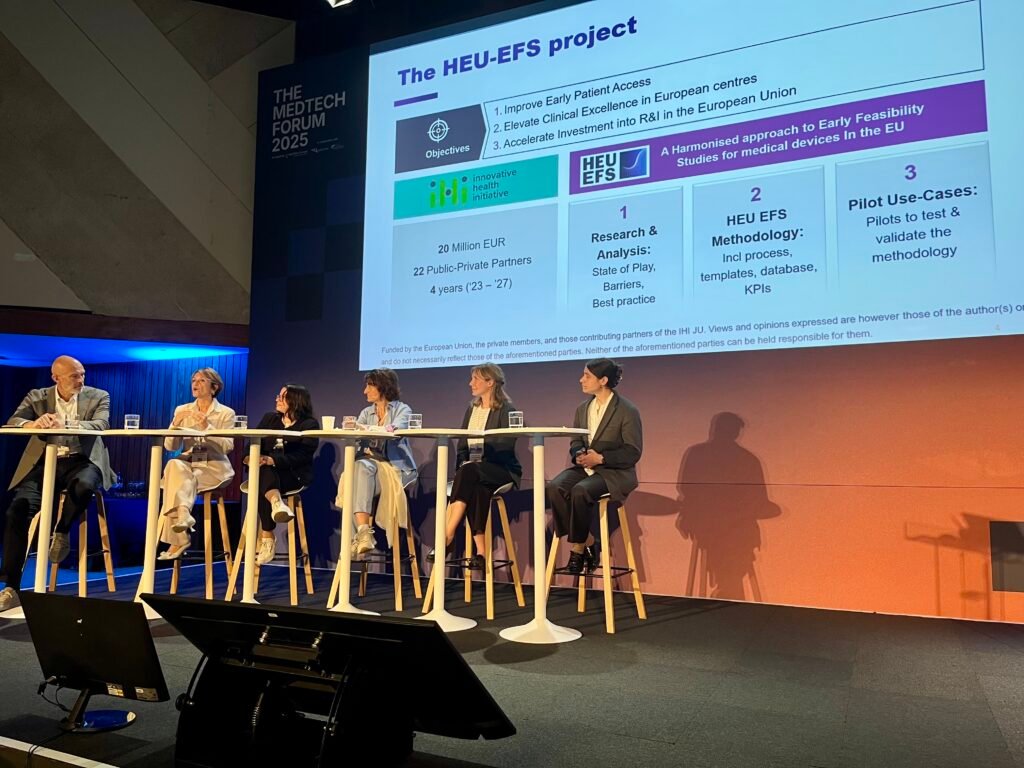
Next Steps
- 𝗖𝗼𝗻𝘁𝗶𝗻𝘂𝗲𝗱 𝗖𝗼𝗹𝗹𝗮𝗯𝗼𝗿𝗮𝘁𝗶𝗼𝗻: We will continue to work closely with our partners to refine and implement the EFS methodology.
- 𝗘𝗻𝗴𝗮𝗴𝗲𝗺𝗲𝗻𝘁 𝗮𝗻𝗱 𝗙𝗲𝗲𝗱𝗯𝗮𝗰𝗸: Ongoing engagement with stakeholders will be essential to ensure the methodology meets the needs of all parties involved.
Thank you to the moderator and excellent speakers at #MTF2025 for their insightful contributions and for making complex issues accessible and engaging to a wider audience.
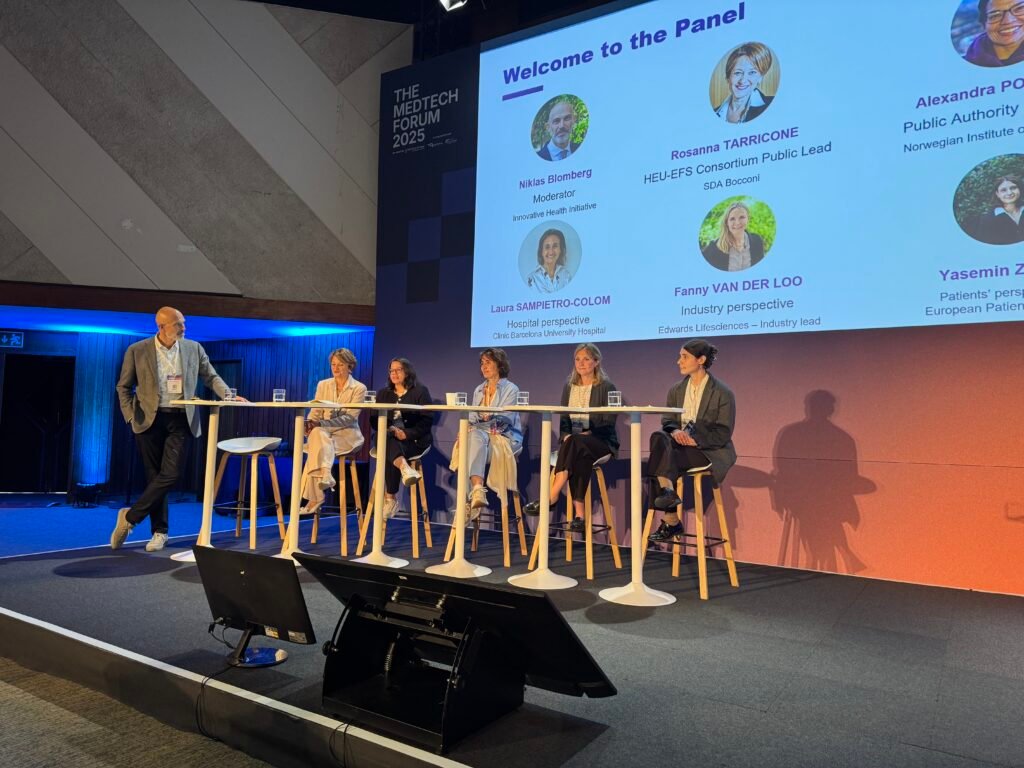
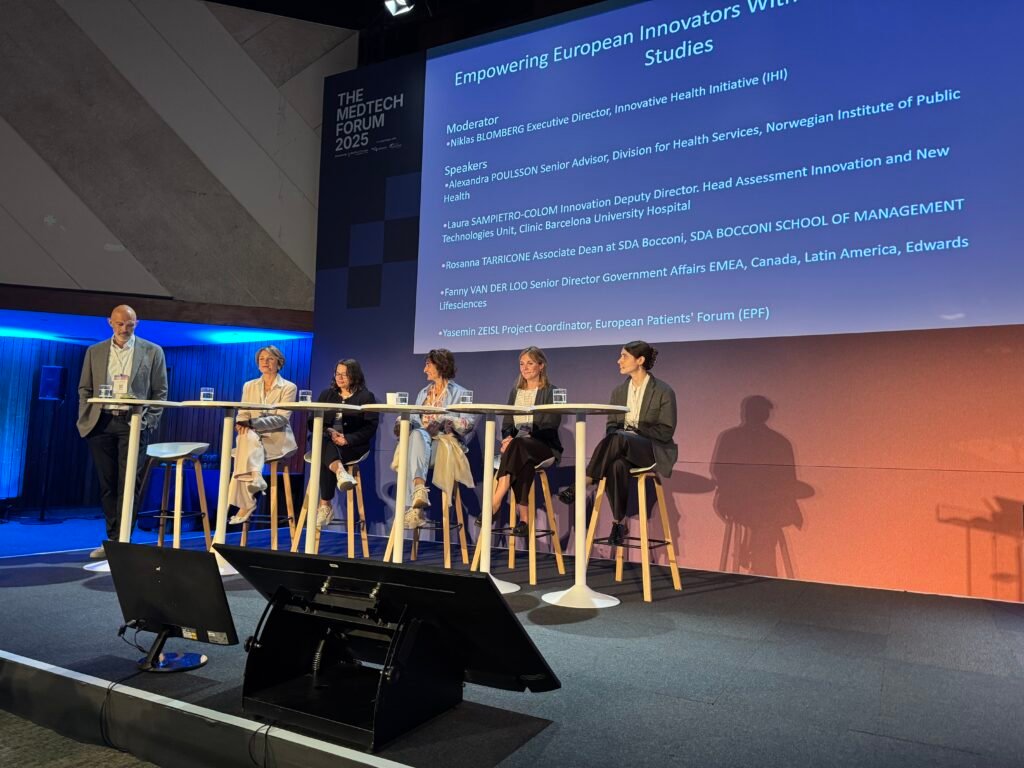
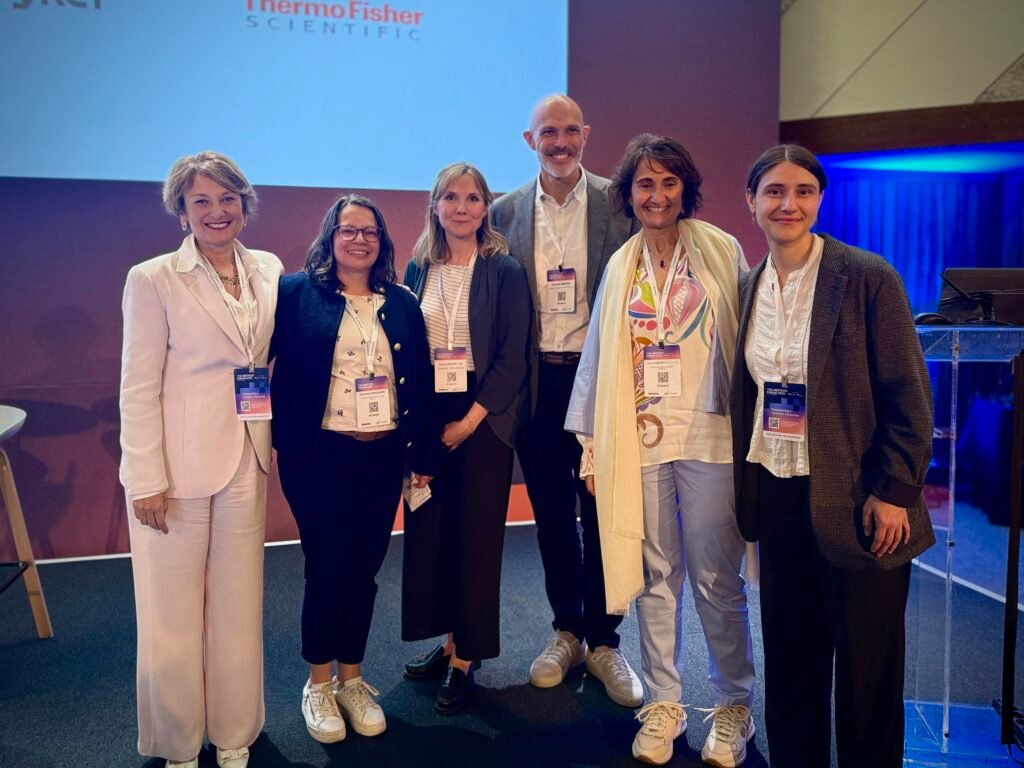
Moderator
Niklas Blomberg, Innovative Health Initiative (IHI)
Speakers
- Rosanna Tarricone, SDA Bocconi
- Alexandra Poulsson, Norwegian Institute of Public Health
- Laura Sampietro-Colom, Hospital Clínic de Barcelona
- Fanny van der Loo, Edwards Lifesciences Europe
- Yasemin Zeisl, European Patients’ Forum
Innovative Health Initiative (IHI) MedTech Europe EFPIA – European Federation of Pharmaceutical Industries and Associations COCIR EuropaBio – the European Association for Bioindustries Vaccines Europe
ISPOR 2025
Bridging the Gap in Early Stage Clinical Research: Lessons for EU Stakeholders From the US FDA Early Feasibility Studies Program
Date: 15/05
Time: 13:45 – 14:45 (PDT)
Location: Montreal, QC, Canada
Session Type: Concurrent Breakout Session
Join us for an engaging session on Bridging the Gap in Early Stage Clinical Research: Lessons for EU Stakeholders From the US FDA Early Feasibility Studies Program. This event will explore the challenges and opportunities in early-stage clinical investigations for medical devices (MDs) and what the EU can learn from the US FDA’s Early Feasibility Studies (EFS) Program.
Moderator:
- Giuditta Callea, PhD, SDA Bocconi School of Management, Milano, Italy
Speaker:
- Kevin Drisko, Edwards Lifesciences, Irvine, CA, United States
Session Overview:
- Issue: Developing innovative, significant risk MDs often requires early-stage clinical investigations when non-clinical testing is unavailable or not informative. The US FDA’s EFS Program, established in 2013, provides guidance and oversight to MD developers while safeguarding patients. The fragmented EU regulatory system poses challenges to conducting EFS, potentially hindering innovation. This session will discuss what the EU and other global jurisdictions can learn from the FDA’s experience to facilitate safe and harmonized EFS.
- Kevin Drisko (EDW) will offer insights into the advantages of EFS as an integrated step in MD clinical evidence generation.
- Prof. Giuditta Callea will discuss the challenges of pre-market clinical research for MDs in the EU, representing multi-stakeholder perspectives and presenting findings from the HEU-EFS project.
- Audience Q&A: Prof. Callea will direct audience questions.
This session is highly beneficial for regulators, healthcare providers, patient associations, academic and research organizations, CROs, ethical and legal experts, and technology developers. Don’t miss this opportunity to gain valuable insights and engage with experts in the field. Register here!